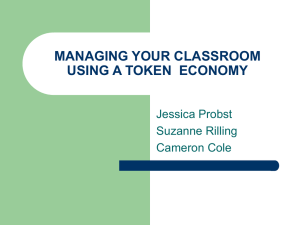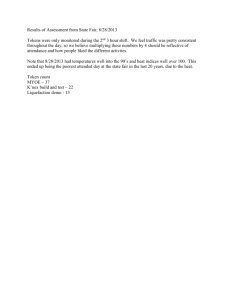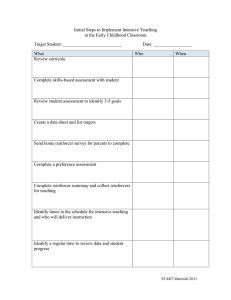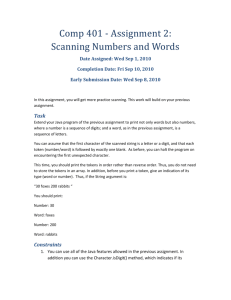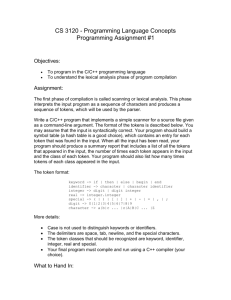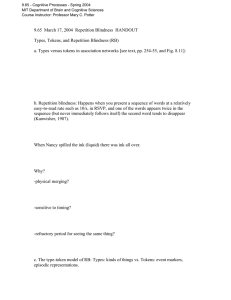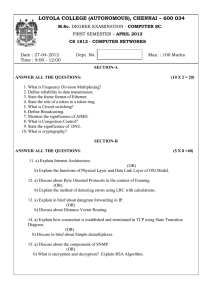Token Economy - Vanderbilt Kennedy Center
advertisement
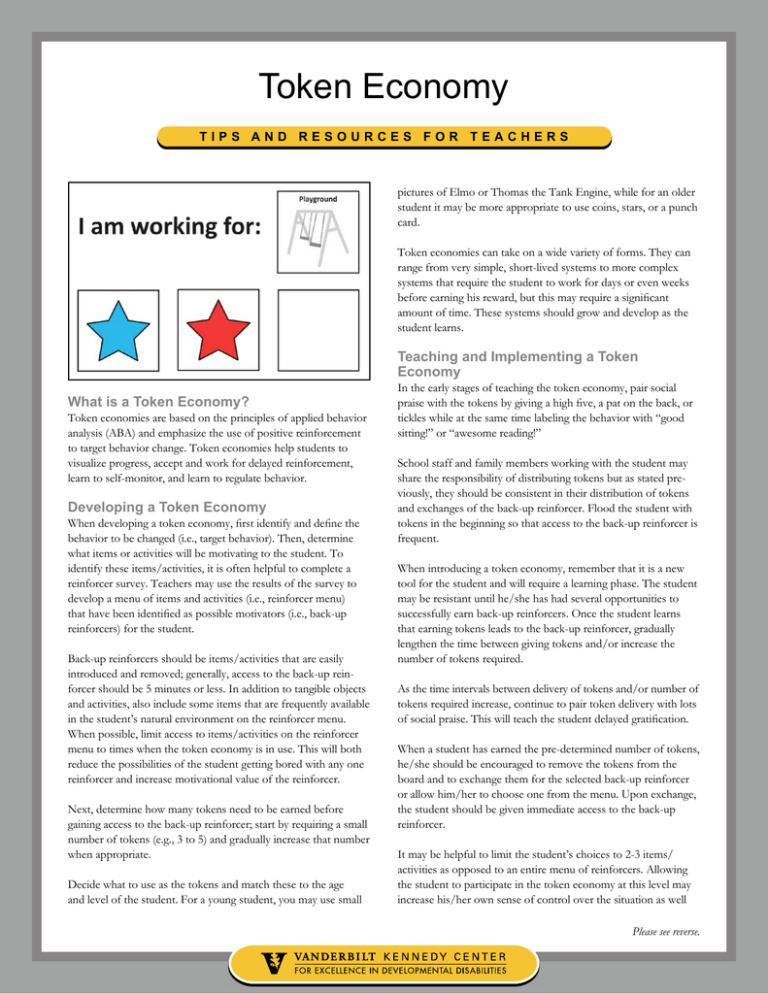
Token Economy TIPS AND RESOURCES FOR TEACHERS pictures of Elmo or Thomas the Tank Engine, while for an older student it may be more appropriate to use coins, stars, or a punch card. Token economies can take on a wide variety of forms. They can range from very simple, short-lived systems to more complex systems that require the student to work for days or even weeks before earning his reward, but this may require a significant amount of time. These systems should grow and develop as the student learns. Teaching and Implementing a Token Economy What is a Token Economy? Token economies are based on the principles of applied behavior analysis (ABA) and emphasize the use of positive reinforcement to target behavior change. Token economies help students to visualize progress, accept and work for delayed reinforcement, learn to self-monitor, and learn to regulate behavior. Developing a Token Economy When developing a token economy, first identify and define the behavior to be changed (i.e., target behavior). Then, determine what items or activities will be motivating to the student. To identify these items/activities, it is often helpful to complete a reinforcer survey. Teachers may use the results of the survey to develop a menu of items and activities (i.e., reinforcer menu) that have been identified as possible motivators (i.e., back-up reinforcers) for the student. Back-up reinforcers should be items/activities that are easily introduced and removed; generally, access to the back-up reinforcer should be 5 minutes or less. In addition to tangible objects and activities, also include some items that are frequently available in the student’s natural environment on the reinforcer menu. When possible, limit access to items/activities on the reinforcer menu to times when the token economy is in use. This will both reduce the possibilities of the student getting bored with any one reinforcer and increase motivational value of the reinforcer. Next, determine how many tokens need to be earned before gaining access to the back-up reinforcer; start by requiring a small number of tokens (e.g., 3 to 5) and gradually increase that number when appropriate. Decide what to use as the tokens and match these to the age and level of the student. For a young student, you may use small In the early stages of teaching the token economy, pair social praise with the tokens by giving a high five, a pat on the back, or tickles while at the same time labeling the behavior with “good sitting!” or “awesome reading!” School staff and family members working with the student may share the responsibility of distributing tokens but as stated previously, they should be consistent in their distribution of tokens and exchanges of the back-up reinforcer. Flood the student with tokens in the beginning so that access to the back-up reinforcer is frequent. When introducing a token economy, remember that it is a new tool for the student and will require a learning phase. The student may be resistant until he/she has had several opportunities to successfully earn back-up reinforcers. Once the student learns that earning tokens leads to the back-up reinforcer, gradually lengthen the time between giving tokens and/or increase the number of tokens required. As the time intervals between delivery of tokens and/or number of tokens required increase, continue to pair token delivery with lots of social praise. This will teach the student delayed gratification. When a student has earned the pre-determined number of tokens, he/she should be encouraged to remove the tokens from the board and to exchange them for the selected back-up reinforcer or allow him/her to choose one from the menu. Upon exchange, the student should be given immediate access to the back-up reinforcer. It may be helpful to limit the student’s choices to 2-3 items/ activities as opposed to an entire menu of reinforcers. Allowing the student to participate in the token economy at this level may increase his/her own sense of control over the situation as well Please see reverse. Token Economy TIPS AND RESOURCES FOR TEACHERS as ensure that the selected reinforcer is indeed motivating to the student at that moment in time. Fading a Token Economy The goal of the token economy is to teach appropriate behaviors that will generalize to use in the natural environment. Therefore, it is necessary to have a plan for fading the token economy to prevent the student from developing a dependence on it. As the student becomes increasingly successful in response to the token economy, increasing appropriate behavior and decreasing inappropriate behavior, you can begin fading the token system. Keep in mind that even after a token economy has been successfully faded, there may be a time in the future when the student will again benefit from use. A token economy can be faded by dispensing tokens in an increasingly random and intermittent fashion and requiring more tokens to access the back-up reinforcers. Additionally, the use of tangible reinforcers can be faded and replaced with reinforcers that are more readily available in the natural environment. When appropriate, control of the token economy may also be transferred to the student as part of the fading process. This can be accomplished by allowing the student the opportunity to do some or all of the following: identify behaviors to target for change, determine how many tokens should be earned, determine when to dispense tokens, and determine when to exchange tokens for the back-up reinforcer. Who We Are and Who We Serve The Vanderbilt Kennedy Center (VKC) works with and for people with disabilities and their family members, service providers and advocates, researchers and policy makers. It is among only a few centers nationwide to be a University Center for Excellence in Developmental Disabilities, a Eunice Kennedy Shriver Intellectual and Developmental Disabilities Research Center, and a Leadership Education in Neurodevelopmental and Related Disabilities Training Program. The following are some of the ways the Center’s programs and staff can assist families, educators, and other service providers. Vanderbilt Autism Resource Line Free information and referral service for parents, teachers, and community professionals. Information is available about autism-specialized diagnostic evaluation services, school consultation, parent workshops, and professional training at Vanderbilt for children, adolescents, and adults with ASD. Contact autismclinic@vanderbilt.edu, or (615) 322-7565, or toll-free (877) 273-8862. Treatment and Research Institute for Autism Spectrum Disorders (TRIAD) TRIAD is a Vanderbilt Kennedy Center program dedicated to improving assessment and treatment services for children with autism spectrum disorders and their families while advancing knowledge and training. See http://TRIAD.vanderbilt.edu or call (615) 936-0267. Tennessee Disability Pathfinder Tennessee Disability Pathfinder is a free statewide phone, web, and print referral service in English and Spanish. It connects the Tennessee disability community with service providers and resources. Its website database has over 3,000 agencies searchable by Tennessee county and service. Pathfinder is a project of the VKC, TN Council on Developmental Disabilities, TN Department of Health, and the TN Department of Intellectual and Developmental Disabilities. Contact www.familypathfinder.org, (615) 322-8529, toll-free (800) 640-4636. Other Resources Printable Behavior Charts: • http://freeprintablebehaviorcharts.com/ • www.stickersandcharts.com/ • www.chartjungle.com/behavior.html • www.handipoints.com/printable-chart/ Chore Charts: • http://tykoon.com/ • www.myjobchart.com/ Reinforcement Survey • www.jimwrightonline.com/php/jackpot/jackpot.php Apps • Working4 (iPad, iPod touch, iPhone, and Android) • ChorePad HD (iPad, iPod touch, and iPhone) • iReward (iPhone, iPod touch) More on Token Economy • www.educateautism.com/token-economy.html • www.kcbehavioranalysts.com/aba-toolbox/token-economy Content provided by: Alacia Stainbrook, Sarah Blumberg, and Pablo Juarez Contact the Vanderbilt Kennedy Center Nashville (615) 322-8240 Toll-Free (866) 936-VUKC [8852] www.kc.vanderbilt.edu kc@vanderbilt.edu 04/15
